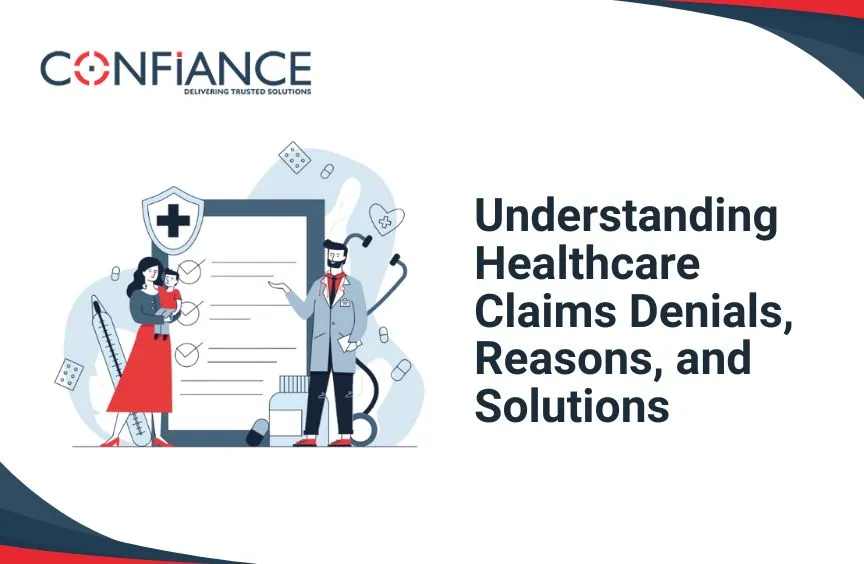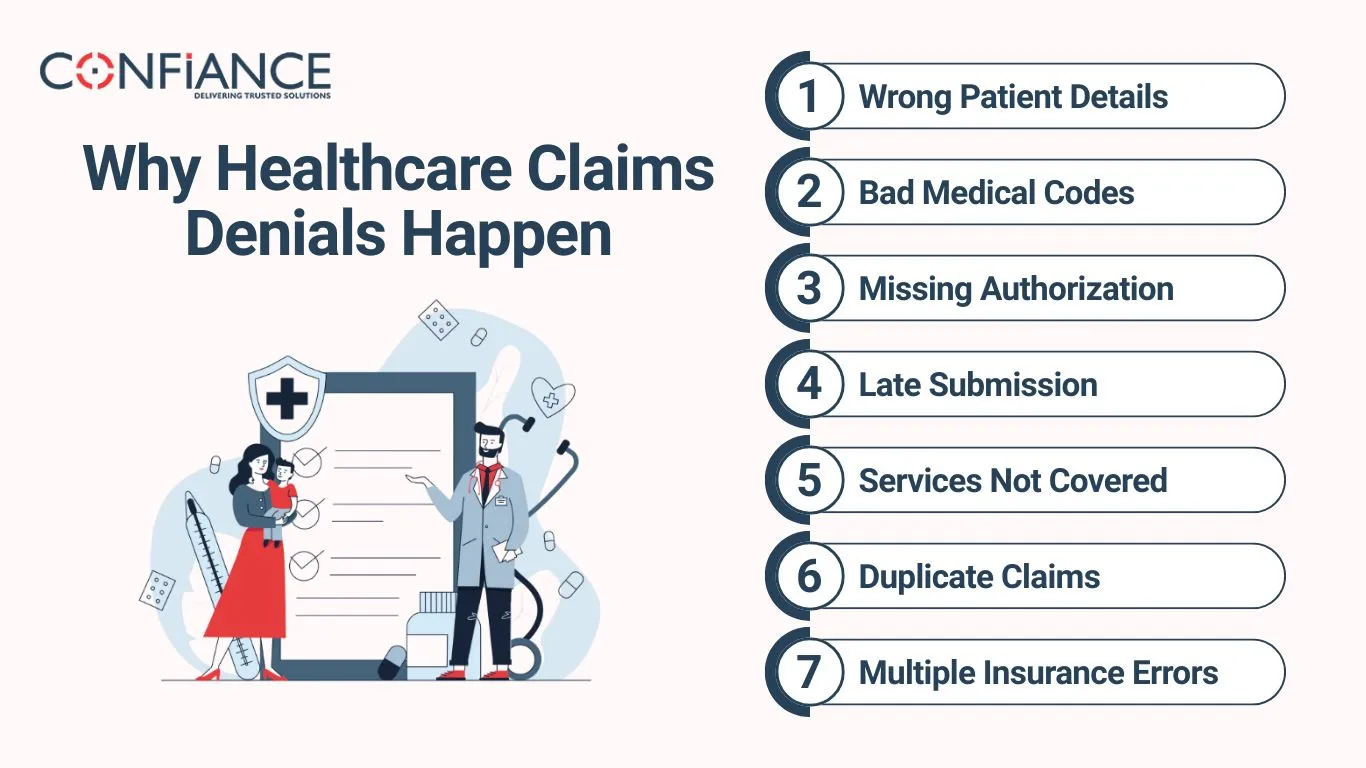
Understanding Healthcare Claims Denials, Reasons, and Solutions
Healthcare claims denials are a big problem for clinics today. When an insurance company refuses a claim, it delays payments. Staff must fix and resubmit claims to get paid. Denials can slow the cash flow a lot.
To run a clinic well, it is key to understand healthcare claims denials. Knowing the main reasons and ways to fix them helps. Using simple steps and good tools can lower denials. Clinics can save time and collect money faster.
What Are Healthcare Claims Denials?
Definition of Denials
Healthcare claims denials happen when insurers refuse to pay claims. Denials may be full or partial, causing payment delays.
Effect on Clinics
Denied claims force staff to spend more time fixing errors. Repeated denials can hurt the clinic's cash flow badly.
Why Healthcare Claims Denials Happen
Wrong Patient Details
Errors in patient info cause healthcare claims denials very quickly. Even small mistakes in names or IDs matter.
Bad Medical Codes
Wrong codes or numbers often cause healthcare claims denials. Correct codes help claims get approved quickly.
Missing Authorization
Some treatments need prior approval from insurers first. Claims without it get denied and need fixing.
Late Submission
Claims sent after the deadline often get denied. Tracking deadlines keeps claims on time and safe.
Services Not Covered
Some treatments are not in the insurance plan. Claims for these services cannot be paid by insurers.
Duplicate Claims
Sending the same claim twice can trigger rejection. Logging all claims helps avoid repeated submissions.
Multiple Insurance Errors
Patients with more than one plan can cause confusion. A wrong primary payer leads to claim denial.

How Healthcare Claims Denials Affect Clinics
Cash Flow Delays
Denied claims slow down incoming payments. Clinics may face a money shortage until claims are fixed.
More Staff Work
Staff spend extra time correcting denied claims. This reduces time for patient care and tasks.
Patient Confusion
Denied claims can make patients unhappy and confused. Clear billing communication helps reduce complaints.
Lower Money Collection
Repeated denials cut down revenue for clinics. Fixing denials helps keep money flow steady.
Office Stress
Tracking and fixing denied claims adds stress for staff. Simple processes lower work pressure a lot.
Types of Healthcare Claims Denials
Hard Denials
Hard healthcare claims denials cannot be appealed very easily. Usually happens due to non-covered services or rules.
Soft Denials
These claims can be fixed and sent again. Coding errors or missing info are common soft denials.
Office Errors
Clerical or form mistakes cause these denials. Simple review and correction can solve them fast.
Medical Need Denials
Insurers issue healthcare claims denials if care seems not needed. Extra records can prove the service was necessary.
Top Reasons for Healthcare Claims Denials
Wrong Patient Info
Incorrect info causes claim rejections often. Always check details before sending claims.
Wrong or Missing Codes
Errors in codes are a top denial cause. Correct coding lowers rejection chances a lot.
Missing Approval
Prior authorization is required for some services. Without it, claims are denied automatically.
Late Claims
Claims must reach insurers on time. Late claims result in healthcare claims denials and payment delays.
Non-Covered Services
Some services are outside the insurance plan. Checking coverage first stops denials.
Duplicate Claims
Sending the same claim again triggers rejection. Keep track of all submissions carefully.
Multiple Insurance Issues
Wrongly choosing primary payer causes denials. Coordination of benefits reduces errors.
Bad Records
Incomplete records can block claim approval. Proper documentation supports claims and avoids rejections.
Coverage Limits
Insurance plans may limit maximum payment. Claims above limits are denied and billed to patients.
Submission Errors
Electronic or form mistakes cause denials. Check claims for errors before sending to insurers.
How to Reduce Healthcare Claims Denials
Check Patient Details
Verify names, dates, and insurance IDs. Accurate info keeps claims from being denied.
Use Correct Codes
Match codes with the service given. Correct coding speeds claim approval.
Get Prior Authorization
Confirm approval for services that need it. Keep records to avoid future denial.
Submit Claims on Time
Track deadlines for each insurance company. On-time claims prevent automatic denials.
Check Coverage
Make sure the service is in the plan. Avoid denials for services not covered.
Avoid Duplicates
Log all submitted claims clearly. Use software to catch repeated submissions.
Keep Good Records
Document all patient visits properly. Records prove medical need and prevent denials.
Train Staff Often
Teach staff coding, filing, and insurance rules. Trained staff reduce claim errors a lot.
Track Denials
Look for patterns in denied claims. Solve repeated issues to save time and money.
Talk to Insurers
Stay updated on changes in policy rules. Good communication avoids claim mistakes.
Benefits of Reducing Healthcare Claims Denials
Faster Payments
Fewer denials speed up payment collection. Clinics get money quickly and keep operations smooth.
Less Work for Staff
Fewer errors reduce rework and stress. Staff can focus on patients and daily tasks.
Higher Revenue
Correct claims get full payments. Clinics improve income and stay financially healthy.
Happy Patients
Accurate bills reduce confusion and complaints. Patients trust clinics with clear billing.
Better Office Flow
Less denial work improves daily operations. Staff can finish tasks faster and easier.
How Technology Can Help
Billing Software
Programs check errors before sending claims. Software reduces claim denials a lot.
Auto Verification
Verify patient info and coverage automatically. Fewer errors mean faster payment.
Denial Tools
Track denied claims with software tools. Staff can fix and resubmit claims fast.
Data Review
Analyze denial trends to stop repeated mistakes. Simple data checks improve claim success.
Best Practices to Handle Denials
Check Claims First
Verify info before sending claims. Pre-check prevents most errors.
Audit Often
Look for errors in claims regularly. Early checks reduce denied claims.
Keep Clear Records
Document patient care in detail. Records prove service and help appeal denials.
Train Staff
Teach staff coding and filing rules. Good training reduces claim mistakes.
Watch Denials
Track trends to fix frequent errors. Solving patterns reduces repeated denials.
Talk to Patients
Explain coverage and costs clearly. Patients stay informed and trust the billing process.
Use Tech Tools
Automate checks to lower errors. Software saves time and improves payments.
Staff Role in Reducing Denials
Front Desk Check
Staff verify patient info accurately. Correct info avoids many healthcare claims denials each day.
Coder Accuracy
Staff match codes to services. The right codes stop denials due to coding errors.
Billing Review
Check claims carefully before sending. Early fixes prevent rejections.
Manager Oversight
Track denial trends and correct errors. Management helps staff improve the claim process.
Common Challenges
High Volume
Many claims increase the chances of mistakes. Careful checks and tools help staff manage.
Insurance Rules
Each insurer has different rules. Staff must know the rules to avoid denied claims.
Staff Changes
New staff may make mistakes. Training helps reduce denial errors.
Multiple Insurers
Patients with many plans cause confusion. Coordination ensures the correct primary payer.
Manual Work
Manual submissions increase healthcare claims denials risk for clinics. Simple software checks reduce mistakes a lot.
Quick Fix for Denials
Find the Reason
Check why the claim was denied. Knowing the reason helps correct it fast.
Fix Errors
Correct info, codes, or missing records. Fast fixes reduce payment delays.
Send Fast
Resubmit claims without delay. Quick submission improves money flow.
Appeal if Needed
Add supporting records for denied claims. Appeals often recover payments successfully.
Follow Up
Track claim till payment arrives. Persistent follow-up keeps revenue on track.
Partnering with Experts
Outsource Billing
Many clinics use experts for claim work. Outsourcing ensures correct claims and fast payment.
Track Denials
Experts watch denied claims carefully. Staff save time and fix claims faster.
Staff Training
Experts train teams to avoid errors. Well-trained staff reduce claim denials a lot.
Healthcare claims denials slow payments and create extra work. Correcting claims quickly improves clinic cash flow efficiently. Simple checks, trained staff, and proper tools reduce repeated errors. Fast denial resolution ensures clinics maintain smooth daily operations.
Partnering with Confiance helps clinics handle claims easily. Our team fixes denied claims and manages billing professionally. Clinics save time and collect payments faster consistently.
FAQs
Q1: What is a healthcare claim denial?
It occurs when insurance refuses to pay a submitted claim.
Q2: Why do healthcare claims denials happen?
Denials happen due to errors in coding or patient information.
Q3: Can denied claims be appealed?
Yes, most claims can be fixed and resubmitted.
Q4: How do denials affect cash flow?
Denials delay payments, reducing the clinic's money flow temporarily.
Q5: How can clinics prevent claim denials?
Verify patient info, use correct codes, and get approvals.
Q6: How does technology help reduce denials?
Software checks errors and tracks claims automatically.
Q7: Are all healthcare claims denials avoidable?
Most can be prevented with careful checks and staff training.
Q8: What is a hard denial?
Hard denials are final and cannot be easily appealed.
Q9: What is a soft denial?
Soft denials can be corrected and resubmitted for payment.
Q10: What are common denial reasons?
Wrong info, coding errors, late filing, or missing approvals.
Q11: How important is prior authorization?
It ensures insurers approve the service before treatment starts.
Q12: Can duplicate claims cause denials?
Yes, submitting the same claim twice often leads to rejection.
Q13: What is a medical necessity denial?
Insurers deny claims if they believe treatment is not needed.
Q14: How does wrong coding affect claims?
Incorrect codes are a major reason for claim denials.
Q15: Can patient errors lead to denials?
Yes, mistakes in names, IDs, or coverage can cause denial.
Q16: How can staff reduce claim errors?
Proper training and clear verification prevent most denials.
Q17: Does timely filing matter for claims?
Yes, late claims are often denied automatically by insurers.
Q18: How can documentation prevent denials?
Complete records prove services were needed and support claims.
Q19: Do non-covered services cause claim denial?
Yes, insurers will deny claims for services outside the plan.
Q20: How can clinics track denials efficiently?
Use software tools and logs to monitor all denied claims.
Q21: Can multiple insurance plans cause denials?
Yes, a wrong primary payer assignment can trigger claim rejection.
Q22: How fast should denied claims be resubmitted?
Claims should be corrected and sent as soon as possible.
Q23: Does outsourcing billing help reduce denials?
Yes, experts manage claims properly and lower denial rates.
Q24: How often should staff be trained?
Regular training ensures coding and filing errors are reduced.
Q25: How can clinics improve patient satisfaction with billing?
Clear billing and quick claim fixes keep patients happy.
